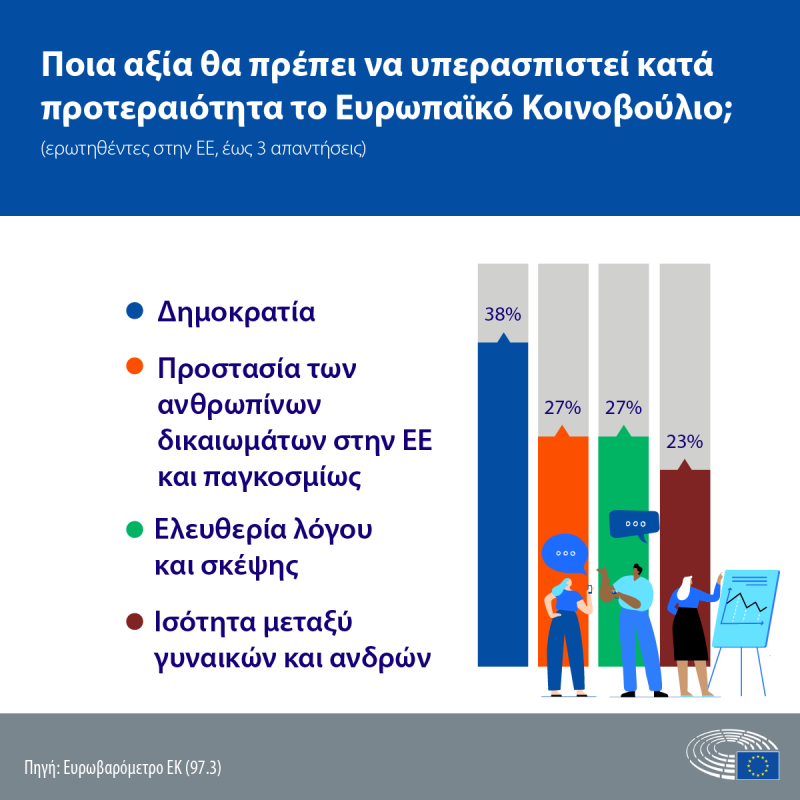As inflation and the cost of living rose long before the Russian invasion of Ukraine, 4 in 10 Europeans in total say they are already experiencing an impact on their standard of living, with the corresponding figure for Greece at 49%.
THE Russia’s attack on Ukraine has boosted public support for the EUaccording to spring research Eurobarometer of Parliament for 2022 published today.
See in detail the survey of the spring Eurobarometer
Almost two-thirds (65%) of Europeans consider their country’s EU membership a “good thing”. This is higher result than 2007, when the corresponding percentage had risen to 58%. The absolute majority of citizens in all countries, except Greece and Slovakia, where the EU membership is positive Most respondents (43% of Greeks) answer that it is “neither good nor bad”. Compared to the latest EP survey conducted at the end of 2021, the results have increased significantly in most countries, especially Lithuania (+20 percentage points), Malta (+12) and Estonia (+9).
See in detail the Eurobarometer that concerns Greece
Image of the EU and the European Parliament
52% of Europeans today have a positive image of the EU, compared to 12% who have a negative one. This result is an increase of 3 points from November-December 2021, while at the same time, it is the best result recorded in a European Parliament survey since 2007. National results for a positive EU image range from 76% in Ireland to 32 % in GREECE.
The President of the European Parliament Roberta Metsolaexpressing satisfaction with the results of the investigation, stated that “With the war back on our continent, Europeans feel safer as part of the European Union. “European citizens have strong ties to freedom, they are ready to defend our values and they are becoming more and more aware that our democracy should no longer be taken for granted.”
War in Ukraine and consequences
Recent events have also affected the image that Europeans have of other important actors on the international stage. At EU level only 10% have a positive view of Russia, compared to 30% the last time the same question was asked in 2018. In the second lowest ranking of the relevant list is China at EU level, with 22% (-14 points). On the contrary, Europeans have a more positive image for the United Kingdom with 65% (+1), followed by the USA with 58% (+13).
Regarding Turkey, 28% of European citizens have a positive view, while the percentage of Greeks who view Turkey positively reaches only 4%. Differences between the Greeks and the average are also recorded in relation to the other countries, with 25% positive opinions among the respondents for Russia and 36% for China. Greeks, on the other hand, view the United Kingdom positively by 46% and the United States by 34%.
Most citizens perceive the war in Ukraine as a fundamental change: 61% of Europeans are not convinced that their lives will remain the same – with the percentage “climbing” to 86% in Greece. According to a survey published last week by the European Commission, 8 out of 10 respondents (80%) agree with imposing financial sanctions on the Russian government, as well as on Russian companies and individuals – down from 70% in Greece. The majority of citizens in 22 Member States are satisfied with the EU response to the Russian invasion of Ukraine, with Greece (44%) still among the exceptions.
As the inflation and the cost of living increased long before the Russian invasion of Ukraine, 4 out of 10 Europeans in total say they are already experiencing an impact on their standard of living (49% in Greece). As a clear sign of European resilience and unity, 59% of Europeans prioritize defending our common European values, such as freedom and democracy – even if it would affect prices and the cost of living. In Greece, 48% of respondents believe that defending these values should be a priority. The vast majority also put price and cost of living restraint (51%) at the top of the list compared to the European average (39%).
EP priorities and values to defend
Growing economic concerns are also reflected in issues where citizens would like the European Parliament to prioritize: the fight against poverty and social exclusion is mentioned as the first priority (38%)followed by public health (35%), which has dropped significantly by 7 points in the last six months. European citizens have chosen as a third priority democracy and the rule of law (32%), a category which in turn marked a significant increase of 7 points. In Hellas support for the economy and job creation are at the top (60%), the fight against poverty and social exclusion is at the top (59%) and public health is at the top (52%).
Public opinion about him war as well as its importance for the EU are also clearly reflected in the core values that citizens want the European Parliament to uphold as a matter of priority: the democracy is again at the top of the list, with an increase of six points compared to the fall of 2021 (38%). They follow the protection of human rights in the EU and worldwide, as well as freedom of speech and thought (27%). In Greece, citizens chose solidarity between EU Member States and democracy as the top value (39% each answer). This was followed by the rule of law (33%) and freedom of speech and thought (30%).
Relevant information
The European Parliament’s Spring Eurobarometer 2022 data collection took place between 19 April and 16 May. The survey involved 26,580 Europeans from the 27 EU Member States. In Greece, 1,014 people participated through a personal interview.











